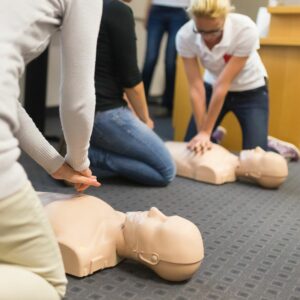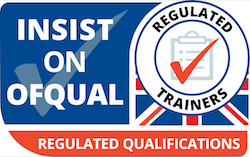What this means and what has changed
The HSE’s 2024 update prompts workplaces to integrate mental health considerations into their first-aid needs assessment. This guidance not only specifies criteria for selecting training providers but also underscores the rising recognition of mental well-being’s significance alongside physical health. This article will explore these updates, including minor terminology changes.
Simplification of guidance on first-aid training providers to make the selection process clearer for employers.
Criteria for Training Provider Selection
The 2024 guidance emphasises the need for employers to be confident in the training provider’s ability to deliver training with appropriate content, use suitable trainers and assessors, and have relevant and robust quality assurance systems in place.
Inclusion of Blended Learning
The document now explicitly accepts blended learning as a means of delivering workplace first-aid training. However in these instances it is required that the employers conduct due diligence to ensure its suitability. This includes ensuring the technology is accessible to the learner, the training provider offers adequate support, has systems to prevent identity fraud, allocates sufficient time for classroom-based learning, and has appropriate means of assessing e-learning components.

Comparison with 2018 Guidance
The 2024 HSE guidance enhances clarity in selecting first-aid training providers compared to the 2018 version, which offered a far broader overview. It streamlines the selection process, highlighting the importance of accredited and well-regulated training programs, such as those approved by Ofqual. This focus on quality assurance, including the suitability of trainers and the use of blended learning, aims to make compliance simpler for employers and enhances the appeal of accredited courses by setting clear standards for content and delivery.

Ofqual courses inherently meet the criteria outlined in the guidance by offering suitable trainers, assessors, and robust quality assurance systems. An RQF (Regulated Qualifications Framework) accredited training program is well-regulated and meets the required standards, making it an optimal choice for employers seeking to comply with requirements and best practices. The emphasis on these criteria in the guidance reinforces the significance of selecting accredited training that ensures comprehensive, compliant, and effective first-aid education for the workplace.
Emphasis on employers’ responsibilities to consider employees’ mental health in their first-aid needs assessment.
The 2024 HSE guidance introduces a significant update by including mental health considerations within first-aid needs assessments, a departure from the 2018 guidance which focused primarily on physical first aid. This change reflects a holistic approach to workplace health and safety, emphasising the importance of addressing both mental and physical health emergencies. It aligns with broader trends towards integrating mental health care into all health and safety practices, highlighting the evolving understanding of comprehensive first-aid training’s role in supporting a safer and more supportive work environment. Employers are encouraged to consider mental health needs alongside physical health concerns when conducting first-aid assessments, as outlined in the document.
How can this be Achieved?
Mental Health First Aid Courses
Companies can opt for Mental Health First Aid and awareness courses, which are now available in various formats. These courses provide essential training on identifying, understanding, and supporting individuals experiencing mental health issues.
Face-to-Face Training
Many training providers offer face-to-face Mental Health First Aid courses. This traditional method allows for direct interaction with instructors and peers, facilitating a deeper understanding of the subject matter.
Government Backed Schemes
Schools can take advantage of government-backed schemes offering grants for Mental Health First Aid training. For instance, there are schemes supporting schools and colleges, providing grants of up to £1,200 to facilitate training in mental health awareness.
Blended Learning
With the acceptance of blended learning, companies can supplement standard first aid courses with e-learning components focusing on mental health awareness. This approach allows for flexibility in training delivery, accommodating various learning preferences and schedules.
Reviewing Needs and Provisioning Learning
It is essential for companies to assess their specific needs and provide appropriate training to meet the mental health requirements of their staff. This involves conducting thorough assessments of the workforce’s mental health needs and selecting training programs that align with those needs effectively.
By considering these options and tailoring training programs to their specific requirements, companies can effectively address the mental health needs of their employees and create a supportive and inclusive work environment.
Change in terminology from “catastrophic bleeding” to “life-threatening bleeding,” with additional guidance on employer actions if identified as a workplace risk.

The 2024 HSE guidance updates terminology from “catastrophic bleeding” to “life-threatening bleeding,” aiming to enhance clarity and accessibility. This change, along with providing detailed actions for employers to take if such a risk is identified, ensures the guidance remains current with medical terminology and first-aid practices. It reflects an effort to stay aligned with the evolving field of first aid and adhere to best practices.
In summary, the 2024 HSE guidance introduces several notable changes to workplace first aid practices. By emphasising the consideration of mental health alongside physical health in first-aid needs assessments, and providing clearer criteria for selecting training providers, the guidance aims to enhance workplace safety and support. These updates reflect a broader understanding of comprehensive first aid and highlight the importance of addressing all aspects of employee well-being. Additionally, the emphasis on selecting accredited and well-regulated training programs underscores the significance of quality assurance in ensuring effective first-aid education for the workplace. As companies adapt to these changes, they can ensure compliance with regulations while promoting a holistic approach to workplace health and safety.
You can find out more information and read the HSE guidance document here. If you would like to discuss how we can meet your first-aid requirements please feel free to contact us through our contact form or you can call us today on 0800 048 7361









